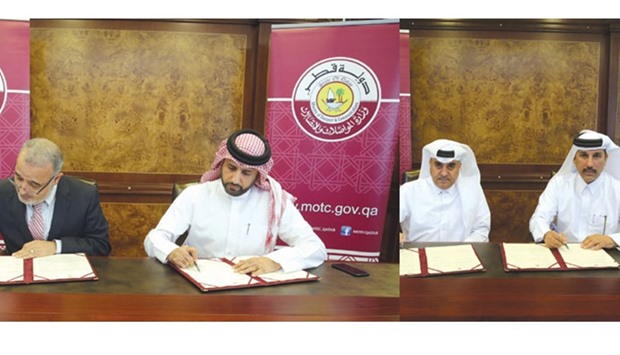The Ministry of Transport and Communications (MoTC) has announced the creation of a consortium aimed at creating an ecosystem that would facilitate the early deployment of Connected and Automated Vehicles (CAV) on a national and regional scale.
A memorandum of understanding (MoU) signed with Qatar Mobility Innovations Centre (QMIC) is seen as a “strategic move” to take the CAV programme in Qatar “to the next level.”
The MoU, signed by assistant undersecretary of Land Transport Rashid Taleb al-Nabet and QMIC executive director and CEO Dr Adnan Abu-Dayya, was among the four MoUs signed by the MoTC aimed at developing a modern transport sector for the state of Qatar.
As a founding member of the consortium, the MoTC will play “an important advisory role” and aid in facilitating development and piloting activities in support of getting Qatar ready to deploy CAV systems and applications.
The MoTC said, “CAV refers to the concept, where as part of newly-emerging co-operative intelligent transport systems, vehicles will be able to communicate with one each other and with the road network wirelessly (V2X), according to global standards.”
“This will enable the realisation of next generation ‘road safety systems’. It is considered as a key enabler for future autonomous and self-driving vehicles. Studies conducted by various transport authorities show that connected vehicles, if fully implemented, could mitigate up to 80% of road accidents. In the past, the focus has been on how to survive accidents; CAV aims to avoid them completely, as well as enhancing our daily driving experience, as a whole,” the MoTC said in a statement.
The MoTC said QMIC has been very active in the area of CAV since 2010. In 2014, it carried out the first field demo of an industry-compliant V2X system and applications in the Mena region at the Qatar Science and Technology Park.
As the next step to facilitate potential full deployment of technology in Qatar, QMIC has committed plans to carry out a field pilot of V2X systems (Qatar V2X pilot) and applications in 2017-2018 in Qatar. This will allow QMIC and its partners to test CAV in real field scenarios as vehicles and roadside units will be used together with a few applications, the MoTC said.
Al-Nabet also signed an MoU with Mawaqif Zakia general manager Mohamed Hlep to explore a potential partnership to create an automated parking system in West Bay, as part of efforts to provide integrated transport system and addressing parking problems in Qatar. The project also promotes public-private partnerships as it would help elevate the efficiency of facilities for local communities and support economic development.
Hassan al-Hail, adviser to HE the Minister of Transport Jassim Seif Ahmed al-Sulaiti also signed an MoU with Smart Transport chairman Abdulaziz Ali bin Hamad al-Attiyah, reflecting the ministry’s interest in developing transport related manufacturing in the country.
The MoTC said it envisions itself to provide a multi-modal transport system that is “integrated, accessible, and inclusive for all citizens in the state of Qatar.”
In addition, the project invites public-private partnership as it would help elevate the efficiency of facilities for local communities and support economic development, the MoTC said.
Al-Hail also signed an MoU with Union Global Projects chairman Sheikh Abdulrahman bin Jassim Ali al-Thani to explore potential ventures in developing transport-related manufacturing industries in the country to diversify and expand economic activities in Qatar.

Assistant undersecretary of Land Transport Rashid Taleb al-Nabet and QMIC executive director and CEO Dr Adnan Abu-Dayya sign the MoU. Hassan al-Hail, adviser to HE the Minister of Transport Jassim Seif Ahmed al-Sulaiti and Smart Transport chairman Abdulaziz Ali bin Hamad al-Attiyah during the signing ceremony.
